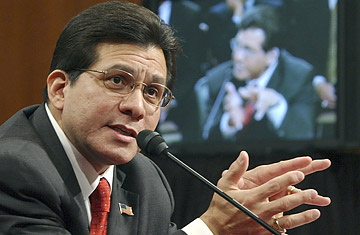
Attorney General Alberto Gonzales testifies before the Senate Judiciary Committee on Capitol Hill in Washington, April 19, 2007.
Alberto Gonzales continued his losing streak on Capitol Hill Thursday. The popular wisdom among Senators and staffers of both parties is that Bush's Attorney General has never once helped himself by testifying before Congress, and his long-awaited testimony before the Senate Judiciary Committee about the controversial firings of eight U.S. attorneys late last year was no exception.
In an all-day hearing that he had spent weeks preparing for, Gonzales failed to reconcile inconsistencies that he and his staff have known about for months. He couldn't recall key meetings, including the one in which he apparently approved firing the U.S. attorneys, the event at the heart of the scandal that has engulfed him. And he even failed to take the lifelines thrown at him by sympathetic Senators, opting for long-winded, evasive-sounding responses rather than straightforward "Yes" or "No" answers. By the end of the session, nearly as many Republicans had lit into Gonzales as Democrats had, with even one openly calling for his resignation.
The question now, however, is not so much whether he hurt himself as whether he hurt anyone else. The White House so far seems unconcerned with how much hot water Gonzales makes for himself with the Democratic-led Congress or the Republican minority there. And President Bush can keep him as long as he likes, in theory. Now everyone in Washington is trying to calculate is how much, if anything, it will cost the President to continue to support his old friend from Texas in the face of growing criticism.
Having a weakened Attorney General at the head of the Justice Department could be bad for at least one major domestic initiative. Bush is trying to get immigration reform through the Congress, and considering how tenuous the support is for his proposed plan, increasing the hostility of Senators in his own party won't help matters. What few other items on his domestic agenda remain in his last two years in office are unlikely to be affected either way — health care reforms and energy independence are the only other two areas of hope for the lame-duck Administration, but neither is making much progress on the Hill anyway.
Gonzales can hurt the White House in other ways, though. He let fly an important new piece of information during his testimony today, for example. His former chief of staff, Kyle Sampson, had previously told Congress that David Iglesias, one of the ousted U.S. attorneys, had been marked for dismissal after Gonzales said that Bush senior advisor Karl Rove had mentioned complaints about the New Mexico prosecutor. Today, Gonzales said that in fact during that conversation, sometime between Oct. 17 and Nov. 15 last year, Rove had actually suggested two other U.S. attorneys as troublesome.
Those two were the U.S. attorneys in Milwaukee, Wisconsin and Philadelphia, Pennsylvania. Gonzales did not indicate why Rove chose those three districts, including Iglesias', nor did he say whether he passed them on without comment to Sampson or why only Iglesias remained on the list. He did say all three had been presented to him by Rove as districts where there were issues of voter fraud and the Administration had made pursuing such cases a priority. Democrats on the Hill say they see a nefarious purpose behind these maneuvers, that they were aimed at suppressing minority voter turnout in these three districts. But there's no evidence to support that claim and it doesn't explain why Rove mentioned only three districts or why two of the U.S. attorneys he did finger ultimately weren't let go.
But the new information shows that the scandal has the potential to grow as new leads emerge from testimony and documents. As long as Gonzales is in place at DOJ, Hill Democrats will be gunning for him. And after Thursday's less than inspiring performance, he'll have even fewer Republicans willing to defend him.
